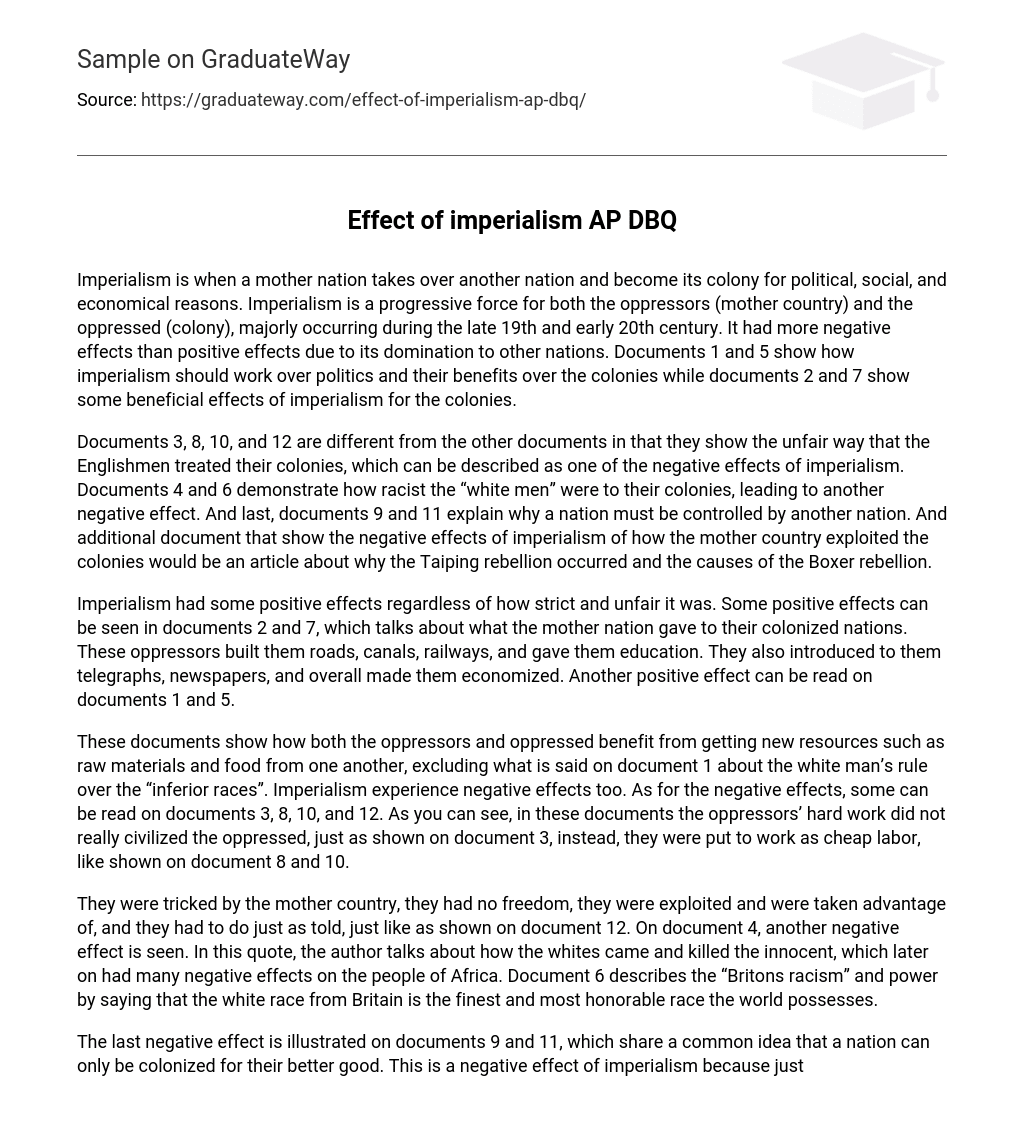Imperialism is the act of a mother nation taking over another nation to become its colony for political, social, and economic reasons. This occurred predominantly during the late 19th and early 20th centuries and was considered a progressive force for both the oppressors (mother country) and oppressed (colony). However, it had more negative than positive effects due to its domination over other nations. Documents 1 and 5 demonstrate how imperialism should work in politics and their benefits for colonies, while documents 2 and 7 show some beneficial effects of imperialism on colonies.
Documents 3, 8, 10, and 12 differ from the other documents as they reveal the unjust treatment of colonies by Englishmen. This can be considered one of the negative effects of imperialism. Documents 4 and 6 demonstrate how white men” were racist towards their colonies, leading to another negative effect. Lastly, documents 9 and 11 explain why one nation must control another nation. An additional document that shows the negative effects of imperialism is an article about why the Taiping rebellion occurred and the causes of the Boxer rebellion. Such a document would shed light on how mother countries exploited their colonies.
Despite its strict and unfair nature, imperialism had some positive effects. Document 2 and 7 highlight the benefits that colonized nations received from their mother country, including the construction of roads, canals, railways, and access to education. The introduction of telegraphs and newspapers also helped these nations become more economically advanced. Additional positive effects are mentioned in documents 1 and 5.
These documents demonstrate that both the oppressors and oppressed benefit from acquiring new resources, such as raw materials and food, from one another. However, it is important to note that Document 1 discusses the white man’s rule over inferior races,” which suggests a problematic power dynamic. Additionally, imperialism has negative effects that are detailed in Documents 3, 8, 10, and 12. These documents reveal that the hard work of oppressors did not necessarily lead to the civilization of the oppressed; Document 3 provides evidence of this fact. Furthermore, these documents illustrate how oppressed individuals were often forced into cheap labor positions (as seen in Documents 8 and 10).
During colonial times, the people of Africa were subjected to various forms of oppression. They were tricked by their colonial masters and had no freedom. Exploitation was rampant, and they had to do just as they were told, as shown in document 12. Document 4 highlights another negative effect where innocent people were killed by white settlers, which had long-lasting negative effects on the African population. Additionally, document 6 describes the racism and power dynamics of Britons who believed that the white race from Britain was superior to all others.
The last negative effect of imperialism is illustrated in documents 9 and 11. These documents share the common idea that a nation can only be colonized for its own good. This is a negative effect because, as shown in document 11, if the U.S. has the right to hold onto the Philippines, then they are just imitating the basis of imperialism and can lead to an outcome similar to the one shown in document 9 – the white man’s burden.” Imperialism cannot be considered a good cause and effect because while it may seem positive at first, in the long run, as demonstrated here, it becomes more of a negative effect.
All Africans and Asians were exploited and given no rights, despite being introduced to modern culture by their mother countries. Colonies had to fight wars for independence in order to establish their own rules. The mother country would take over other nations solely for their own benefit, seeking raw materials, markets for goods, national glory, balance of power and even feeling a sense of obligation to help smaller nations – which Europeans referred to as the white man’s burden”. In doing so, the mother countries often destroyed ethnic groups and caused civil wars between smaller nations.
Modern imperialism can be described as never being good. When a nation took over a smaller nation for economic, political, or social reasons, they became imperialistic and created an oppressor and oppressed system between the mother and colonized nations. As expected, they changed the modern world significantly and made it harder to live during that time. However, it depends on a person’s point of view. Some may think it was positive overall, but it ultimately led to negative consequences in this world. Even though modern imperialism occurred more than 100 years ago, its effects still linger today in how our nations were divided.





